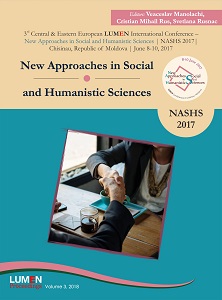The Quality of Education and Training in the Context of Knowledge Based Society
The Quality of Education and Training in the Context of Knowledge Based Society
Author(s): Gheorghe Braniste, Viorica Calugher, Ecaterina Lungu
Subject(s): Essay|Book Review |Scientific Life
Published by: Editura Lumen, Asociatia Lumen
Keywords: education; training; knowledge; performance; competitiveness;: quality; educational services.
Summary/Abstract: The strategic objective of the contemporary era is to increase the intellectual potential of society. Starting from this, the XXI century draws a priority to create a modern industry education, which will become an important area of investment, more advantageous than the development of a science, knowledge and education. The quality of education and training has become an area of particular interest, given, first of all to national gap with the developed countries and the need to make an integrated finality in the European context. European Commission’s concerns regarding the importance of education and vocational training is reflected within the Europe 2020 Strategy by developing and adopting ‘guidelines’ concerning the quality of services provided by educational institutions. In a world rapidly changing, the European Union wishes to become a smart and favourable economy for the inclusion by creating a “knowledge triangle” of education, research and innovation, to function properly and to help young people to improve their skills, essential in terms of competitiveness, equity and social inclusion. Being responsible for preparing young generations of graduates in various fields of knowledge, the university is also responsible for the future of society and of the future state of the nation. Quality of education and training is an essential process of maximum importance for becoming, progress of learners and society at the same time. Among the motivational factors that determine universities to worry about the quality of education and training are: orientation towards performance and increase market competitiveness of universities and graduates of educational services in the market of labour resources; the expansion of investment in education research and process development; European market recognition of qualifications (degrees, diplomas) by institutions in the country; development of an institutional culture of quality, fully involved in obtaining staff performance; increased responsibility for quality of academic benefits.
Book: New Approaches in Social and Humanistic Sciences - NASHS 2017
- Page Range: 103-110
- Page Count: 8
- Publication Year: 2018
- Language: English
- Content File-PDF

